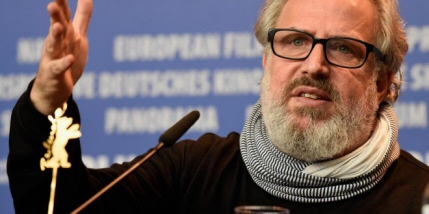Israeli film-director Udi Aloni, who won the top audience at Berlin Film Festival on Saturday, has labelled the Israeli government “fascist”, and has urged Germany to cease its military support to Israel.At a Q&A session about his award-winning film Junction 48 hours before being presented with the Panorama Audience Award for best fiction film, Mr Aloni said Germany should stop supporting the “fascist regime of Israel”:
“Merkel does not mention the occupation and sells submarines to Netanyahu to continue such things.”
According to the PNN, the 56-year-old also called Israel a “democracy of white people” and added that, “in contrast to the [Israeli] prime minister who spreads hatred, my movie spreads love and co-existence.”
By the end of the session, he mentioned Palestinian hunger-striker Mohammad al-Qeeq as an example “non-Jews’ lack of rights in Israel”, saying that al-Qeeq was dying in administrative detention without being accused of committing a crime.
In a response to Aloni’s comments, according to the Israeli Media, the Israeli Culture Minister Miri Regev said that Israel should not fund films that slander it, refering to the financial support that Aloni’s film received from Israel’s Culture Ministry.
“Aloni’s statements were a clear proof that artists who subvert the state, defame it and hurt its legitimacy should not be funded by the tax payer. A sane country should not assist slanderers and denouncers who malign it, immediately after drinking from its coffers,” Regev stated.
The Israeli film director later clarified to Channel 10 that his comments “were directed against the Israeli government and not against the country, which I love. In contrast to the prime minister who spreads hatred, my movie spreads love and co-existence.”
Last year, more than 3,000 artists, including some of the country’s most prominent actors and directors, signed a petition against Ms Regev’s policies.
“Junction 48” – which is an Arabic-language film that features mostly Palestinian actors – tells the story of a Palestinian rap star and his girlfriend who live near Tel Aviv, in the mixed Jewish-Palestinian city of Lod, known until recently as one of the main drug-running centers of the Middle East.
Actress Samar Qupty said it should be easy for Palestinians to identify with the movie, even though it depicts people living lives that are radically different from strict Muslim traditions.
Her character, for example, allows a picture of her face to be used on a poster advertising a hip-hop concert, prompting members of her family to say they plan to injure her if she performs.
“It’s still a revolutionary movie because it doesn’t talk about the way we Palestinians are usually represented in the world,” Qupty said.
“We are representing ourselves by the new generation without trying to prove anything to anyone, with our ‘goods’ and ‘bads’,” she told Reuters in an interview. “We are trying to present what is the real new generation trying to do without making the reality looking any better or any worse.”
Search IMEMC: ‘boycott’

